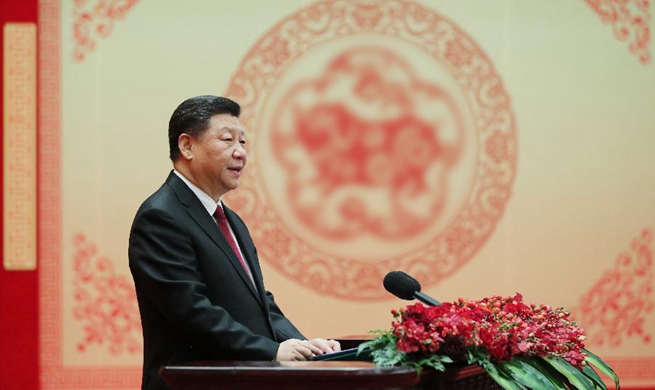by Peter Mertz
DENVER, the United States, Feb. 7 (Xinhua) -- Reaction ranged from being hopeful to incredulous after U.S. President Donald Trump's promise to eliminate AIDS in America by 2030.
Trump's bold statement in his second State of the Union address Tuesday first triggered words of hope from America's embattled front-line groups that fight the deadly disease. But after the dust had settled, pundits started forcing the president's hand.
DIVERSION FROM BIG PROBLEMS
"The entire statement by Trump is a diversion away from his big problems," said Washington policy analyst David B. Richardson on Thursday.
"A complete distraction," Richardson told Xinhua, noting that the president's tax returns, his involvement with Russian interference in the 2016 presidential elections, and the Democratically-controlled House of Representatives, had made Trump "desperate for diversions."
"Scientific breakthroughs" made the goal attainable, Trump said, whose announcement was old news for health organizations, including the United Nations, which years ago called for steps to end the HIV epidemic by 2030.
Robert Redfield, director of the U.S. Centers for Disease Control and Prevention (CDC), said in March 2017 that it was possible to end the AIDS in less than seven years.
Trump also piggybacked on a 2010 HIV strategy outlined by then President Barack Obama that focused on lowering the infection rate and increasing access to medical care.
"He's just throwing ideas into the wind so the media gobbles them up in the hope it distracts them away from his possible impeachment," said Richardson, a policy analyst on Capitol Hill in the 1980s.
The first reported case of AIDS in the United States was in 1981. Since then, more than 700,000 people with AIDS have died in the United States, according to the CDC. Today, there are over 1.1 million people living with HIV and nearly 40,000 new diagnoses each year.
AIDS has no cure, but daily doses of antiretroviral medications have allowed victims to live relatively long and healthy lives. However only half of all people living with HIV are virally suppressed.
BUDGET BURDEN
On Tuesday night, along with his consistent banter about immigration and the questionable achievements of his two years in office, Trump unleashed the surprise of his 82-minute speech.
"My budget will ask Democrats and Republicans to make the needed commitment to eliminate the HIV epidemic in the United States within 10 years," the president said.
"Together, we will defeat AIDS in America and beyond," he added.
Insiders told Xinhua that the final words: "and beyond," were not part of Trump's written speech, but adlibbed by the president at the last minute.
Health Secretary Alex M. Azar II said Trump will seek "substantial new funds for the effort," another remark that stunned both Democrats and Republicans.
Projections from the White House's Office of Management and Budget (OMB) say the federal budget deficit will reach 1 trillion U.S. dollars in 2019, roughly 101 billion dollars more than previously projected.
Trump, who campaigned on a balanced budget and reducing federal expenditures, apparently on Tuesday added another big expense to the deficit. Financial details of the new AIDS initiative are expected next month.
However, Trump's 2019 financial year budget, submitted in February 2018, includes cutting 40 million dollars from CDC's HIV prevention programs, and 26 million dollars from federal housing programs for people living with AIDS, as well as cutting global HIV programs by 1 billion dollars, according to the Congressional Budget Office.
On Wednesday, the non-profit AIDS United posted an open letter reacting to Trump's speech -- signed by 22 of the nation's leading anti-AIDS advocates, including groups in San Francisco, Chicago, and Texas.
"We know what it will take to end the HIV epidemic in the U.S. by 2030," the letter began.
"The real proof will be in the President's FY 2020 budget request next month," it ended.
INCONGRUITY BETWEEN WORDS, DEEDS
Although AIDS Institute's Michael Ruppal said the plan "can go down in history as one of the most significant achievements of his presidency," other experts were quick to note the incongruity between the president's words deeds.
"The barriers to ending AIDS have long been a lack of investment in outreach and access," said James Hamblin, author of "If Our Bodies Could Talk."
"Trump has contributed to these obstacles with racist, sexist, anti-transgender, anti-science rhetoric. Until now, his words have worked at almost every turn to fuel HIV's spread," Hamblin said.
"His words are not backed by his actions," said Californian businessman and Africa expert John Ott, noting that Trump stopped U.S. assistance to the World Health Organization (WHO) in Africa, which fights to control spread of the disease across the continent.
According to a report released last week by Global Health Policy, there are 25 million AIDS victims in 10 southern African countries -- the largest concentration of victims on the planet.
"If Trump was actually interested in helping AIDS victims he would embrace universal health insurance to treat AIDS sufferers, a policy he actively works against," Richardson said.

















